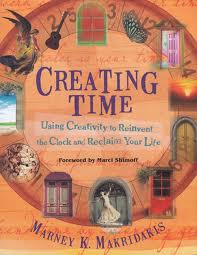Shared Wisdom Guest Post
Featuring Marney Makridakis, author of Creating Time
Pay attention to the conversations of people around you, and notice how often the subject of time comes up:
“I’m fine, just crazy busy. . .”
“I just don’t know when I can find the time. . .”
“I can’t really talk now, I’m running late. . .”
People used to be tied to things like families, communities, rituals, worship, curiosity, and beauty. Now we are tied to schedules, watches, datebooks, computers, and keeping up with the latest gadgets that start with i. It seems like time is going by faster than ever these days, and we’re all exhaustively trying to find, chase, save, and manage time.
Time-management techniques, as well as the latest time-tracking and productivity aids, can certainly be of help to us on the practical level, but they are limited in their long-term effectiveness, since the true nature of time extends beyond the chronological hours displayed in our calendars, wristwatches and smart phones. Time management can improve what we accomplish but often at the peril of what we experience. Ironically, the more we desperately try to manage our time, the more fragmented we often feel.
Instead of exhaustively striving for time management, I propose a new solution of time metaphorphosis. Rather than simply managing our time, we can re-imagine time itself and completely reshape our relationship to it. When we don’t have time, we have to create it, and the incredible news is that we can do so with one of the greatest resources ever to exist on our planet: human creativity.
The concept of “creating time” is not just about adding more hours in our day, but creating a new relationship with time itself. We expand our sense of time by when we change the ways we think about, measure, and experience time.
Here are some good places to start:
1. Change the Way You Think About Time
For most of us, being stressed or worried about time has become second-nature. The most immediate way to change these deeply-ingrained patterns is to become more aware of the words that you use when you think about and talk about time. Time reacts as if we’re yelling in a canyon; whatever we are saying about time comes back to us in our experience. If we are saying, “There’s never enough time,” then our experience echoes back, “Yes! There’s never enough time!” If, however, we are saying, “I have all the time in the world. More and more, I see that I have all the time I need,” then our experience is reflected back with a more expansive, flowing sense of time.
Another simple way to shift awareness is simply to check the clock in a different way. The phrase, “What time is it?” inherently indicates that we do not have control of our time. By replacing this phrase with “What time does the clock say?” we take control of our time through the words we speak. The new phrase indicates that we respect the clock, but we are the ones in charge of our time.
2. Change the Way You Measure Time
We measure time in linear fashion, with numbers on a clock and squares on a calendar to represent the movement of time. But what if we could interpret time as a qualitative entity instead of something just measured by quantity? Instead of measuring how long something takes, why not measure it by how much we learn by doing it, or how much love we are feeling?
Think about the moments in your life that have meant the most to you. Those moments are not viewed linearly at all, but through a plethora of other measurements, such as intensity of experience, emotional depth, and even quality of color or the particular scent of the moment. We can learn from these experiences by applying a similar free-form perception in our everyday moments. So, in your day-to-day life, instead of measuring how long something takes, explore new measurements, such as how much joy you feel, how connected you are to other people, how grateful you are, how engaged you are in the topic at hand.
Incorporating these new “measurements” doesn’t mean that we are forgoing the linear methods entirely. Rather, we remain aware of both kinds of time (quantitative and qualitative), but it is the qualitative measurements that are, in the long run, more important. Our sleeping hours are a great example of this duality. Most of us would prefer to get six hours of deep, restful sleep rather than nine hours of tossing and turning. While we can be aware of the number of hours we sleep and even plan our schedule to ensure that we sleep a certain number of hours, we are far more focused on the quality of the sleep that we have achieved. Similarly, when evaluating our time, we can be aware of the hours and minutes passed, but the quality of those moments is what really matters.
3. Change the Way You Experience Time
Instead of seeing time as something separate from us, true freedom happens when we become one with time, partnering with it in a new way. We can invite it into a relationship, a dance, so that we can fall into oneness. When we are truly at one with time, we reach a blissful state of being less aware of time itself but more aware of the present moment.
We can become more present through simple, easy actions. Expand the breadth of time literally, through deep breaths. Observe what each of your senses is taking in. Feel your feet on the earth’s floor. Express gratitude for all the “little things” that are easily taken for granted. Each of these is an example of a simple way to connect with the fullness of time.
Each moment you fully insert yourself in the present, you change your experience of time, shifting your focus away from how you spend time to instead reveling in what you receive from it.
***
Marney K. Makridakis is the author of Creating Time. She founded the Artella online community for creators of all kinds and the print magazine Artella. A popular speaker and workshop leader, she created the ARTbundance approach of self-discovery through art. She lives in Dallas, Texas. Visit her online at http://www.artellaland.com.
Based on the book Creating Time: Using Creativity to Reinvent the Clock and Reclaim Your Life ©2012 by Marney Makridakis. Published with permission of New World Library http://www.newworldlibrary.com
Thank you so much, Marney, for sharing your words on Soul Speak! I can honestly say that I view my relationship with time differently after reading this article. I love how you invite us to partner with time and create a relationship with it, rather than seeing it as separate from us. Breathing into time is a beautiful way to look at it – one that I will remember when I’m feeling as though there is never enough time. Thank you!
If this post spoke to you, please comment below and share it on Facebook and Twitter! 🙂
 P.S. – The June/July issue of Aspire Magazine is out, and my article, Choosing to Wake Up is included! This issue is packed with so much goodness – click here to subscribe for FREE and receive many amazing bonuses, too. Yay!
P.S. – The June/July issue of Aspire Magazine is out, and my article, Choosing to Wake Up is included! This issue is packed with so much goodness – click here to subscribe for FREE and receive many amazing bonuses, too. Yay!







Hi & thanks for this Ladies,
I believe if you prioritise the important things in your Life and spend “the time” on those…..then you have plenty of time…nothing is wasted on unimportant stuff
be good to yourselves
David
I look at time in general just as a tool that helps me organize myself and the things I have to do. Nothing more than that. I f I know how to use that tool, I would never find myself in a situation where I can’t do things because a lack of time.
Yasou Marney,
Time is something we could all use more of. I love all your suggestions!
One thing I have been doing is using an affirmation when I feel stressed over time concerns:
“I always have more than enough time to do everything I desire each day.”
It calms me down to repeat this when I’m feeling overwhelmed and helps me to focus on the expansiveness of time.
Yes, I’ve started to savor time, even though I do go through the “i am fine but crazy busy”. Important to feel textures and nuances in the little things to truly appreciate time. I’ve found it enough to think that I have time for everything – rather than wonder where I’ll find the time for something.
Beautiful read. Thank you Marney and Jodi.
Hi Marney (and Jodi),
Thanks for this wonderful post. I especially loved the line, “Time management can improve what we accomplish but often at the peril of what we experience. ” So often, people are set on accomplishing their goals but sacrifice living from their soul in what they’re accomplishing. This is a great reminder to all of us to slow down, enjoy life, and think of time in a much more fruitful and healthy way.
Domini
Awesome! I was writing a book about time, but I switched gears, I love the topic, it is fascinating! Kudos to Marney!
Hi Marney and Jodi,
Time can seem like our friend and other times our foe. We fight to pack our day with our To Do list and other essentials. Your article is a breath of fresh air and I love your tips on how to savor each moment in time. Thanks for sharing a great post!